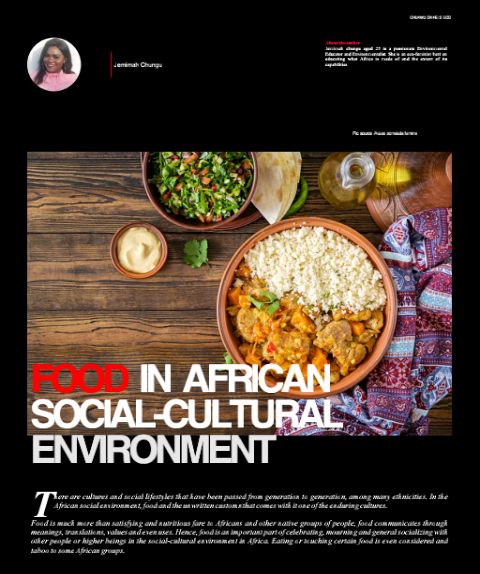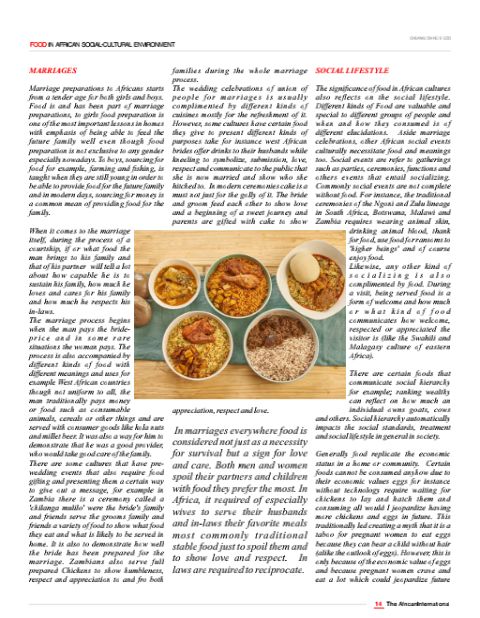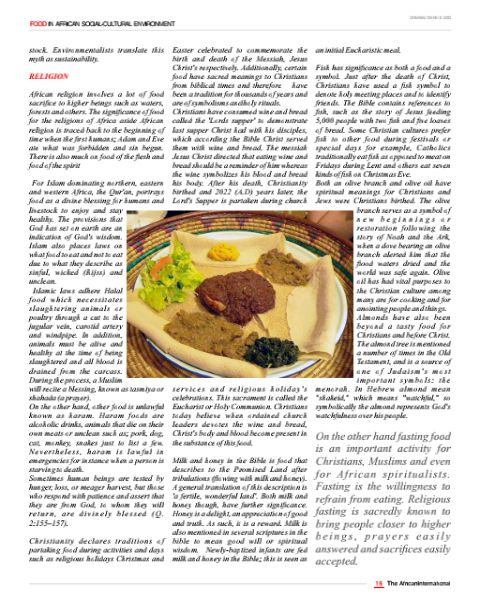
By Jemimah Chungu
There are cultures and social lifestyles that have been passed from generation to generation, among many ethnicities. In the African social environment, food and the unwritten customs that comes with it one of the enduring cultures.
Food is much more than satisfying and nutritious fare to Africans and other native groups of people, food communicates through meanings, translations, values and even uses. Hence, food is an important part of celebrating, mourning and general socializing with other people or higher beings in the social-cultural environment in Africa. Eating or touching certain food is even considered and taboo to some African groups.

MARRIAGES
Marriage preparations to Africans starts from a tender age for both girls and boys. Food is and has been part of marriage preparations, to girls food preparation is one of the most important lessons in homes with emphasis of being able to feed the future family well even though food preparation is not exclusive to any gender especially nowadays. To boys, sourcing for food for example, farming and fishing, is taught when they are still young in order to be able to provide food for the future family and in modern days, sourcing for money is a common mean of providing food for the family.
When it comes to the marriage itself, during the process of a courtship, if or what food the man brings to his family and that of his partner will tell a lot about how capable he is to sustain his family, how much he loves and cares for his family and how much he respects his in-laws.
The marriage process begins when the man pays the bride-price and in some rare situations the woman pays. The process is also accompanied by different kinds of food with different meanings and uses for example West African countries though not uniform to all, the man traditionally pays money or food such as consumable animals, cereals or other things and are served with consumer goods like kola nuts and millet beer. It was also a way for him to demonstrate that he was a good provider, who would take good care of the family.
There are some cultures that have pre-wedding events that also require food gifting and presenting them a certain way to give out a message, for example in Zambia there is a ceremony called a ‘chilanga mulilo’ were the bride’s family and friends serve the grooms family and friends a variety of food to show what food they eat and what is likely to be served in home. It is also to demonstrate how well the bride has been prepared for the marriage. Zambians also serve full prepared Chickens to show humbleness, respect and appreciation to and fro both families during the whole marriage process.
The wedding celebrations of union of people for marriages is usually complimented by different kinds of cuisines mostly for the refreshment of it. However, some cultures have certain food they give to present different kinds of purposes take for instance west African brides offer drinks to their husbands while kneeling to symbolize, submission, love, respect and communicate to the public that she is now married and show who she hitched to. In modern ceremonies cake is a must not just for the golly of it. The bride and groom feed each other to show love and a beginning of a sweet journey and parents are gifted with cake to show appreciation, respect and love.
In marriages everywhere food is considered not just as a necessity for survival but a sign for love and care. Both men and women spoil their partners and children with food they prefer the most. In Africa, it required of especially wives to serve their husbands and in-laws their favorite meals most commonly traditional stable food just to spoil them and to show love and respect. In laws are required to reciprocate.
SOCIAL LIFESTYLE
The significance of food in African cultures also reflects on the social lifestyle. Different kinds of Food are valuable and special to different groups of people and when and how they consumed is of different elucidations. Aside marriage celebrations, other African social events culturally necessitate food and meanings too. Social events are refer to gatherings such as parties, ceremonies, functions and others events that entail socializing. Commonly social events are not complete without food. For instance, the traditional ceremonies of the Ngoni and Zulu lineage in South Africa, Botswana, Malawi and Zambia requires wearing animal skin, drinking animal blood, thank for food, use food for ransoms to ‘higher beings’ and of course enjoy food.
Likewise, any other kind of socializing is also complimented by food. During a visit, being served food is a form of welcome and how much or what kind of food communicates how welcome, respected or appreciated the visitor is (like the Swahili and Malagasy culture of eastern Africa).
There are certain foods that communicate social hierarchy for example; ranking wealthy can reflect on how much an individual owns goats, cows and others. Social hierarchy automatically impacts the social standards, treatment and social lifestyle in general in society.
Generally food replicate the economic status in a home or community. Certain foods cannot be consumed anyhow due to their economic values eggs for instance without technology require waiting for chickens to lay and hatch them and consuming all would l jeopardize having more chickens and eggs in future. This traditionally led creating a myth that it is a taboo for pregnant women to eat eggs because they can bear a child without hair (alike the outlook of eggs). However, this is only because of the economic value of eggs and because pregnant women crave and eat a lot which could jeopardize future stock. Environmentalists translate this myth as sustainability.

RELIGION
African religion involves a lot of food sacrifice to higher beings such as waters, forests and others. The significance of food for the religions of Africa aside African religion is traced back to the beginning of time when the first humans; Adam and Eve ate what was forbidden and sin begun. There is also much on food of the flesh and food of the spirit
For Islam dominating northern, eastern and western Africa, the Qur’an, portrays food as a divine blessing for humans and livestock to enjoy and stay healthy. The provisions that God has set on earth are an indication of God’s wisdom. Islam also places laws on what food to eat and not to eat due to what they describe as sinful, wicked (Rijss) and unclean.
Islamic laws adhere Halal food which necessitates slaughtering animals or poultry through a cut to the jugular vein, carotid artery and windpipe. In addition, animals must be alive and healthy at the time of being slaughtered and all blood is drained from the carcass. During the process, a Muslim will recite a blessing, known as tasmiya or shahada (a prayer).
On the other hand, other food is unlawful known as haram. Haram foods are alcoholic drinks, animals that die on their own meats or unclean such as; pork, dog, cat, monkey, snakes just to list a few. Nevertheless, haram is lawful in emergencies for instance when a person is starving to death.
Sometimes human beings are tested by hunger, loss, or meager harvest, but those who respond with patience and assert that they are from God, to whom they will return, are divinely blessed (Q. 2:155–157).
Christianity declares traditions of partaking food during activities and days such as religious holidays Christmas and Easter celebrated to commemorate the birth and death of the Messiah, Jesus Christ’s respectively. Additionally, certain food have sacred meanings to Christians from biblical times and therefore have been a tradition for thousands of years and are of symbolisms and holy rituals.
Christians have consumed wine and bread called the ‘Lords supper’ to demonstrate last supper Christ had with his disciples, which according the Bible Christ served them with wine and bread. The messiah Jesus Christ directed that eating wine and bread should be a reminder of him whereas the wine symbolizes his blood and bread his body. After his death, Christianity birthed and 2022 (A.D) years later, the Lord’s Supper is partaken during church services and religious holiday’s celebrations. This sacrament is called the Eucharist or Holy Communion. Christians today believe when ordained church leaders devotes the wine and bread, Christ’s body and blood become present in the substance of this food.
Milk and honey in the Bible is food that describes to the Promised Land after tribulations (flowing with milk and honey). A general translation of this description is ‘a fertile, wonderful land’. Both milk and honey though, have further significance. Honey is a delight, an appreciation of good and truth. As such, it is a reward. Milk is also mentioned in several scriptures in the bible to mean good will or spiritual wisdom. Newly-baptized infants are fed milk and honey in the Bible; this is seen as an initial Eucharistic meal.
Fish has significance as both a food and a symbol. Just after the death of Christ, Christians have used a fish symbol to denote holy meeting places and to identify friends. The Bible contains references to fish, such as the story of Jesus feeding 5,000 people with two fish and five loaves of bread. Some Christian cultures prefer fish to other food during festivals or special days for example, Catholics traditionally eat fish as opposed to meat on Fridays during Lent and others eat seven kinds of fish on Christmas Eve.
Both an olive branch and olive oil have spiritual meanings for Christians and Jews were Christians birthed. The olive branch serves as a symbol of new beginnings or restoration following the story of Noah and the Ark, when a dove bearing an olive branch alerted him that the flood waters dried and the world was safe again. Olive oil has had vital purposes to the Christian culture among many are for cooking and for anointing people and things.
Almonds have also been beyond a tasty food for Christians and before Christ. The almond tree is mentioned a number of times in the Old Testament, and is a source of one of Judaism’s most important symbols: the menorah. In Hebrew almond mean “shakeid,” which means “watchful,” so symbolically the almond represents God’s watchfulness over his people.
On the other hand fasting food is an important activity for Christians, Muslims and even for African spiritualists. Fasting is the willingness to refrain from eating. Religious fasting is sacredly known to bring people closer to higher beings, prayers easily answered and sacrifices easily accepted.

